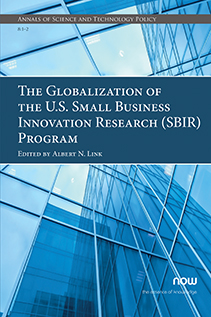Stimulating R&D and Commercialization Activity in New Zealand: An Overview and Case Analysis of Callaghan Innovation’s Grants and Technology Incubator Programme
By Conor O’Kane, University of Otago, New Zealand, conor.okane@otago.ac.nz | Urs Daellenbach, Victoria University of Wellington, New Zealand | Sally Davenport, Victoria University of Wellington, New Zealand | Simon Wakeman, Ministry of Business Innovation and Employment, New Zealand
Abstract
Similar to the Small Business Innovation Research (SBIR) programme in the United States (US), New Zealand (NZ), like many other countries internationally, has designed policy settings that could increase R&D and commercialization activity. In this monograph, we discuss the establishment of Callaghan Innovation in NZ and provide an overview of some of the R&D grant programmes it has put in place over the last decade that most closely align to the goals of SBIR. The primary focus of our monograph is a detailed case overview on a specific Callaghan Innovation-administered initiative, namely the Technology Incubator programme. Specialized technology incubators were formed to identify and evaluate complex intellectual property (IP) from publicly funded universities or Crown Research Institutes (CRIs) and private R&D with the objective of supporting or forming (through investment and incubation services) deep-tech start-ups with global potential. We provide a detailed and critical overview on the policy intent, roll-out and performance of this technology incubator programme. We report on the changes made to try to make the programme more effective and conclude by noting some key differences between it and SBIR.
The Globalization of the U.S. Small Business Innovation Research (SBIR) Program
The Globalization of the U.S. Small Business Innovation Research (SBIR) Program presents how SBIR programs have spread across the globe. The U.S. SBIR program has become a template for legislation in other countries that seek to enhance the innovative nature of small firms. This special issue presents works by leading eminent scholars who describe individually the population of international emulated programs. The works are ordered by the date that the country adopted an SBIR-like program, including Turkey (1995), Australia (1996), Brazil (1997), South Korea (1998), Japan (1999), Taiwan (1999), United Kingdom (2001), The Netherlands (2004), and New Zealand (2012).

Companion
Annals of Science and Technology Policy, Volume 8, Issue 1-2 Special Issue: The Globalization of the U.S. Small Business Innovation Research (SBIR) Program
See the other articles that are also part of this special issue.